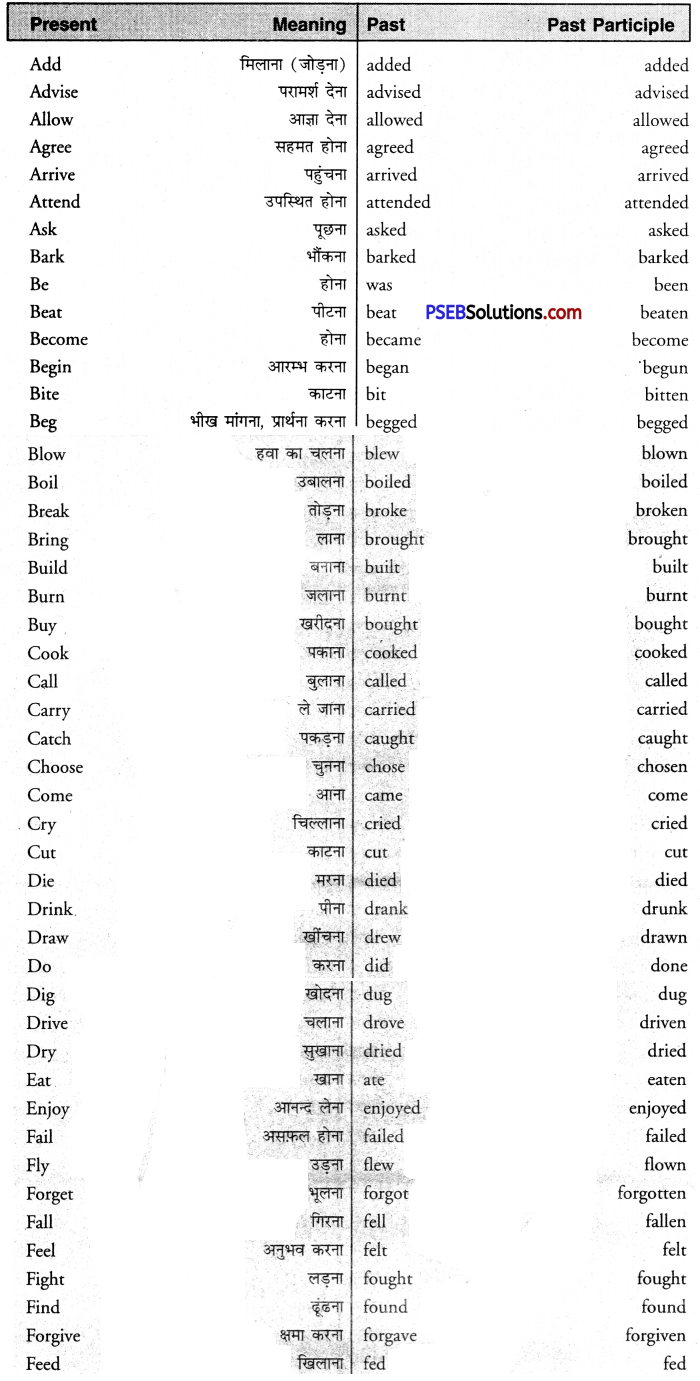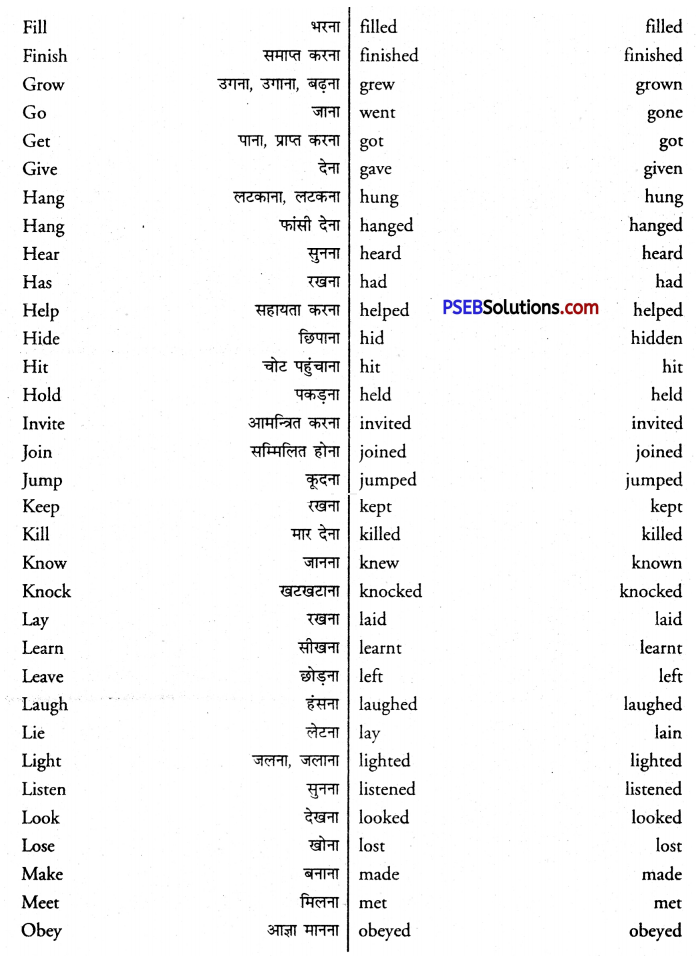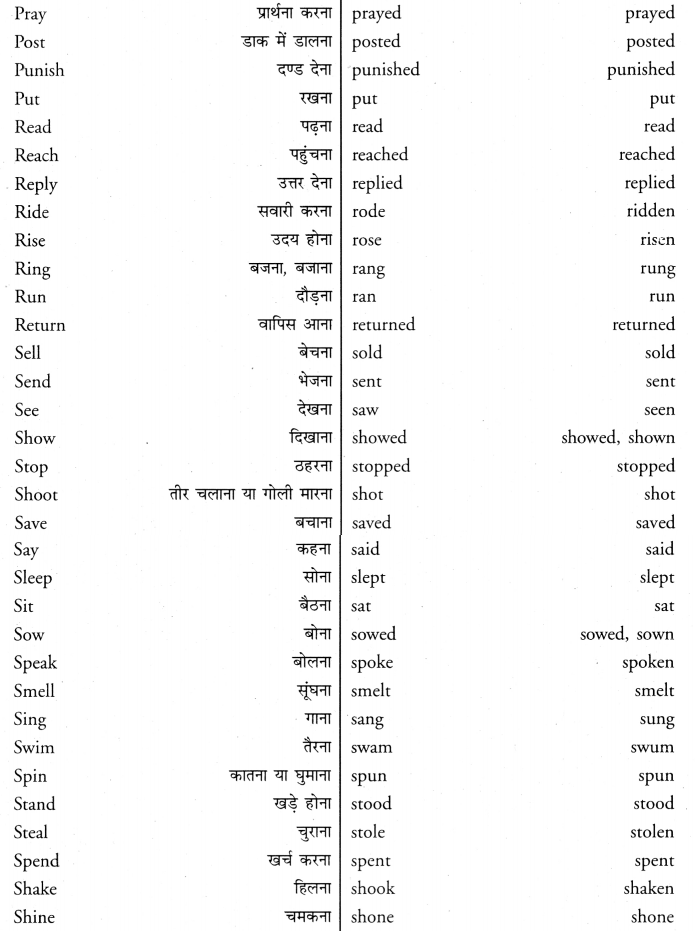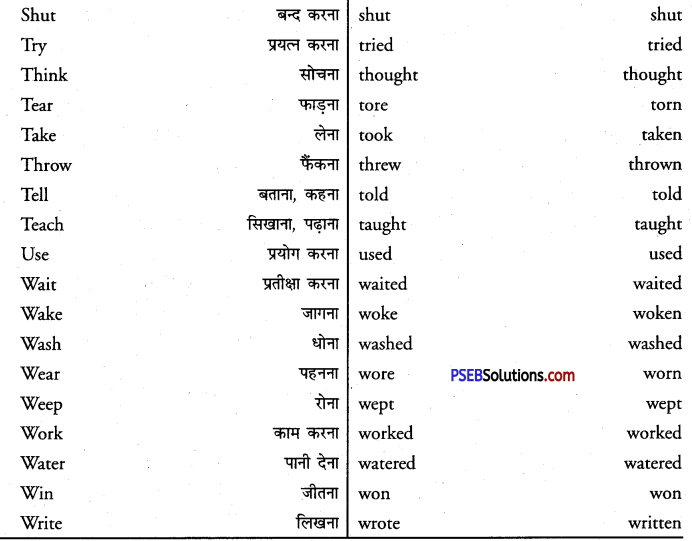Punjab State Board PSEB 8th Class English Book Solutions English Grammar The Verb Exercise Questions and Answers, Notes.
PSEB 8th Class English Grammar The Verb
A word that describes action or state of a person, place, thing, or an event is called verb.
वह शब्द जो शब्द किसी व्यक्ति, स्थान, वस्तु अथवा घटना की क्रिया अथवा स्थिति के बारे में कुछ बतलाए उसे Verb (क्रिया) कहते हैं।
Verbs मुख्यतः तीन प्रकार के होते हैं:
- Transitive
Ram took tea. - Intransitive
Mohan laughs. - Auxiliary
![]()
Primary Auxiliaries
Be
1. Be का प्रयोग Continuous Tense बनाने के लिए किया जाता है:-
He is playing. I was playing.
2. Passive Voice बनाने के लिए
The horse was sold.
3. Infinitive सहित be का प्रयोग किसी आयोजन, प्रबन्ध अथवा समझौते के लिए किया जाता है, जैसे-
I am to go to Delhi tomorrow.
4. आदेश के लिए
You are to see me in the evening.
5. Be का प्रयोग भूतकाल में Perfect Infinitive के रूप में भी किया जाता है। इस प्रयोग में किसी ऐसी व्यवस्था का प्रदर्शन किया जाता है जिसको व्यवहार में नहीं लाया जा सका।
He was to have finished his work last evening but had to leave it on the arrival of the guests.
Have
1. Have का प्रयोग Perfect Tenses के लिए किया जाता है।
He has done his.work.
They have been doing their work.
Do
1. Do का प्रयोग Simple Present तथा Simple Past के नकारात्मक तथा प्रश्नवाचक वाक्य बनाने के लिए किया जाता है।
I do not play.
Do I play?
He does not play.
Does he play?
He did not come.
Did he come?
2. Do का प्रयोग किसी शब्द की दोहराई को रोकने के लिए किया जाता है।
Does she come daily? Yes, she does.
यहां does का अर्थ come शब्द का बोध कराता है अर्थात् Yes, she does. का अर्थ है-हां, वह आती है।
3. Do का प्रयोग किसी बात पर जोर देने के लिए भी किया जाता है।
Please do come.
You do look handsome.
Modal Auxiliaries
1. May and Might
May का प्रयोग होता है-
(a) अनुमति (Permission) देने या लेने के लिए; जैसे,
May I go now?
You may go now.
He may go now.
(b) सम्भावना (Probability) (ऐसी सम्भावना के लिए जिसमें कुछ घटित हो भी सकता है या नहीं भी हो सकता); जैसे,
It may rain today.
It may not rain today.
(c) इच्छा (Wish) को व्यक्त करने के लिए; जैसे,
May you succeed!
(d) May के Past Tense (भूतकाल) के रूप में
He said he might come the next day. (Probability)
He asked if he might borrow my bicycle. (Permission)
(e) अनुमति के लिए (यदि अनुमति वर्तमान में मांगी जा रही हो और इसके मिलने की सम्भावना बहुत ही कमहो); जैसे,
Might I ask a question ?
(f) सम्भावना के लिए (यदि सम्भावना वर्तमान में की जा रही हो और सम्भावना नाममात्र हो); जैसे,
It might not rain tonight.
2. Can and Could
Can का प्रयोग होता है-
(a) अनुमति के लिए (यदि यह अनुमति साधारण बातचीत के दौरान मांगी जाए उस समय can प्राय: may का स्थान लेता है); जैसे,
Can I smoke here?
Yes, you can.
Or
No, you can’t. (यदि अनुमति न देनी हो या यदि ऐसा करने की अनुमति न हो)
(b) सम्भावना के लिए
Pets can be troublesome.
Electricity can be dangerous.
(c) क्षमता या योग्यता के लिए
Can you see the bird in the tree?
I can do this for you.
Could का प्रयोग किया जाता है:
(a) Can के भूतकाल (Past Tense) के रूप में:
He could drive a car at the age of ten.
अतीत में अस्थायी अथवा निजी सफलता के लिए हम could के स्थान पर was or was not able का प्रयोग करते हैं:
He was able to climb the hill without any difficulty.
परन्तु हम could या couldnt का प्रयोग करते हैं:
He couldn’t make much progress in his studies while at school.
(b) विनयपूर्वक प्रार्थना के लिए (यदि यह प्रार्थना वर्तमान में प्रश्नवाचक वाक्य के रूप में की गई हो); जैसे,-
Could I ask you a question ?
Note- भूतकाल की सम्भावना (जो पूर्ण न हुई हो) प्रकट करने के लिए Could का भूतकाल अर्थात् Could have का प्रयोग होता है; जैसे,
You could have caught the train, if you hurried.”
![]()
3. Would
Would का प्रयोग होता है-
(a) Will तथा Shall के भूतकाल (Past Tense) के रूप में; जैसे,
He said he would be moving into his new house next month.
(He said, “I shall be moving……….”)
(b) विनयपूर्वक प्रार्थना (a polite request) के लिए; जैसे,
Would you please close the door?
(c) किसी की इच्छा जानने के लिए (an enquiry about someone’s wish; जैसे,-
Would you like to have a cup of tea ?
(d) ऐसी घटनाएं (Happenings) या कार्य (Actions) जो भूतकाल में बार-बार या कभी-कभी घटित होती या होते थे, जैसे-
Sometimes he would come home drunk and shout at his children.
Note-भूतकाल में सम्भावना व्यक्त करने के लिए would का past tense, would have का प्रयोग किया जाता है; जैसे-,
Had he run fast, he would have caught the train.
4. Should
Should का प्रयोग होता है-
(a) कर्त्तव्य (Duty) अथवा नैतिक उत्तरदायित्व (Moral obligation) प्रकट करने के लिए; जैसे-
We should stand united.
(b) परामर्श (Advice) अथवा निर्देश (Instructions) अथवा दृष्टिकोण (Opinion) व्यक्त करने के लिए; जैसे-
You should see a doctor at once.
5. Must
Must का प्रयोग होता है-
(a) आवश्यकता (Necessity) प्रकट करने के लिए; जैसे,
You must save money for old age.
(b) उत्तरदायित्व (Obligation) प्रकट करने के लिए; जैसे,
You must pay your fees before Tuesday.
(c) तर्कसंगत निष्कर्ष अथवा निश्चितता प्रकट करने के लिए; जैसे,
The fan in the headmaster’s room is on. He must be in.
Note:
1. निषेधवाचक वाक्यों के लिए must not का प्रयोग करना चाहिए; जैसे,
You must not come here again.
2. भूतकाल में निश्चितता अथवा निष्कर्ष प्रकट करने के लिए must का स्थान must have ले लेता है; जैसे,
Mohan must have passed. He had been working quite hard.
3. भूतकाल में आवश्यकता व्यक्त करने के लिए must का Past Tense, had to का प्रयोग करना पड़ता है; जैसे,
The candidates had to appear for an interview after the written test.
6. Need
Need का प्रयोग दो प्रकार का होता है-
(i) नियमित verb के रूप में
We need a lot of money for the wedding.
(ii) Modal के रूप में (ऐसा केवल प्रश्नवाचक तथा नकारात्मक वाक्यों में होता है); जैसे,
Need I come again?
No, you needn’t.
Note- भूतकाल में Need का स्थान need का Past Tense, need have ले लेता है; जैसे,
Need he have taken all that trouble ?
7. Ought
Ought का प्रयोग प्रायः Should जैसी भावना व्यक्त करने के लिए होता है:
(a) परामर्श अथवा सिफारिश व्यक्त करने के लिए-जैसे,
You ought to read this book. It is very exciting.
(b) नैतिक अथवा सामाजिक कर्तव्य के लिए-जैसे,
People ought not to take or offer bribes.
(c) निष्कर्ष के लिए-जैसे,
The train ought to be at the platform. Passengers are coming out of the station with their luggage.
Note-
1. Ought का Past Tense, Ought to have होता है; जैसे- The driver ought to have been more careful. (This has the meaning that the driver
was not careful.)
2. Indirect Speech में Past Tense की क्रिया के बाद ought में कोई परिवर्तन नहीं किया जाता; जैसे, The captain of the school team stated that they ought to win the trophy.
![]()
8. Shall.
Shall का प्रयोग (प्रथम पुरुष-I Person) के साथ होता है:
- भविष्य के लिए-I shall go to Delhi tomorrow.
- प्रार्थना के लिए-Shall we use this pen?
- इच्छा जानने के लिए-Shall I accompany you to your house?
- इच्छा व्यक्त करने के लिए-I shall gladly do it.
- चेतावनी या धमकी देने के लिए-You shall be fined for coming late. (इस अर्थ में shall का प्रयोग II या III person के साथ किया जाता है।)
- आदेश देने के लिए-You shall not come here again.
- वचन के लिए-He shall be rewarded for his good work. (इस अर्थ में भी shall का प्रयोग II या III person में होता है।)
9. Will
Will का प्रयोग (II या III Person के साथ) होता है-
- भविष्य के लिए-You will get good marks.
- प्रार्थना के लिए-Will you help me?
- निमन्त्रण के लिए-Will you dine with us tonight?
- आदेश के लिए- “You will reach here at 8,” said the Principal.
- आदत के लिए-A dog will always remain faithful to his master.
- भविष्यवाणी के लिए- You will fail if you do not work hard.
(I Person के साथ Will का प्रयोग)
- वाचन देने के लिए-I will see you tomorrow without fail.
- संकस्थ के लिए- I will not bow before them.
- इरादा व्यक्त करने के लिए- From here we will go to the circus ground direct.
Forms of the Verb
Verb के निम्नलिखित चार रूप होते हैं:
- Present form (First form)
- Past form (Second form)
- Past Participle form (Third form)
- Present Participle form (ing form)
आगे कुछ महत्त्वपूर्ण verbs की First, Second एवं Third forms दी गई हैं। इन्हें ध्यान से पढ़ें एवं AIG off :
Orms (Conjugation of the Verb




Agreement of The Verb With The Subject
अंग्रेजी भाषा को शुद्ध लिखने के लिए वाक्य में Subject (कर्ता) का Verb (क्रिया) के साथ ठीक ताल-मेल होना अनिवार्य है। कहने का अभिप्राय यह है कि Verb वाक्य के Subject के वचन (Number) तथा पुरुष (Person) के अनुसार होना चाहिए; जैसे,
Ram goes.
Ram and Sham go.
They go.
She goes.
The boys are going
A boy is going.
They were going.
He/She was going.
Subject तथा Verb के उपयुक्त तालमेल के लिए अग्रलिखित नियमों का अध्ययन करें:
![]()
(1) यदि दो या दो से अधिक एकवचन Subjects को and से जोड़ा जाए तो प्रायः उनके साथ बहुवचन Verb का प्रयोग होता है; जैसे,
Mohan and Ram are friends.
Mohan, Sham and Ram play together.
He and his brother have done the work.
Sham and Gopal were there in the meeting.
He and his friend do not work together.
(2) यदि दो एकवचन संज्ञाएं (Nouns) किसी एक व्यक्ति या किसी एक चीज़ का बोध कराती हों तो ऐसी एकवचन संज्ञाओं (Nouns) के साथ एकवचन Verb का प्रयोग होता है; जैसे,-
My brother and helper has arrived.
The leader and speaker is sitting on the stage.
A great Gandhian and leader is dead.
नोट-
(i) यदि एक ही व्यक्ति का बोध कराना हो तो Article का प्रयोग दोनों संज्ञाओं अथवा विशेषणों में से पहली संज्ञा या विशेषण के साथ ही किया जाता है। ऊपर के वाक्य (2) में केवल leader से पहले
The और वाक्य (3) में Gandhian से पहले A का प्रयोग किया गया है।
(ii) यदि वाक्य दो संज्ञाओं से दो अलग व्यक्तियों का बोध कराता हो तो दोनों संज्ञाओं के साथ उचित Article का प्रयोग किया जाता है। ऐसे वाक्य में बहुवचन क्रिया का प्रयोग होता है।
The leader and the speaker are sitting on the stage.
(3) यदि दो Subjects मिलकर किसी एक ही विचार (one idea) को व्यक्त करते हों तो एकवचन क्रिया (Verb in Singular) का प्रयोग होता है; जैसे,-
Fish and meat is the food of the Bengalis.
Slow and steady wins the race.
Twenty kilometres is not a long distance.
The horse and the carriage has arrived.
Early to bed and early to rise makes a man healthy, wealthy and wise.
(4) यदि एकवचन कर्ता (Subject) से पूर्व each अथवा every का प्रयोग किया जाए तो एकवचन क्रिया (Verb in Singular) का प्रयोग होता है; जैसे,-
Every boy and girl was well dressed.
Every man, woman and child was present.
Each day and each hour takes its account.
(5) यदि दो या दो से अधिक एकवचन Subjects को or, nor, either…….. or, neither………..nor से जोड़ा जाए तो एकवचन क्रिया का प्रयोग होता है; जैसे,
Work or play has no difference for me.
Either Mohan or Sohan has broken the slate.
Neither he nor I was present.
Neither food nor water was available there.
(6) जब or तथा nor से जोड़े गए Subjects का वचन भिन्न-भिन्न हो तो बहुवचन क्रिया का प्रयोग किया जाता है तथा बहुवचन Subject को क्रिया के साथ रखा जाता है; जैसे,
Sham or his brothers have broken the slate.
Neither the monitor nor the students were present.
Neither the speaker nor the listeners were serious.
Either the man or his sons have gone wrong.
(7) जब विभिन्न कर्ता (Subjects) or अथवा nor से जुड़े हुए हों, तो क्रिया (Verb) अपने निकटतम् Subject के Person (पुरुष) से मेल खाती है; जैसे,
Either he or I have to go to Delhi.
Neither you nor he is to blame.
Either your father or you are paying for it.
(8) जब Subjects के वचन अथवा पुरुष (Person) में अन्तर हो और वे and से जुड़े हों तो क्रिया (Verb) बहुवचन में प्रयोग होती है; जैसे,
He and I are good friends.
My father and I have jointly done this.
You and he are always together.
You and I are always in time.
(9) समूहवाचक संज्ञा (Collective Noun) के साथ पूरे समूह का भाव व्यक्त करने के लिए एकवचन क्रिया (Verb in Singular) का प्रयोग होता है। परन्तु यदि समूह के व्यक्तियों (individuals) का बोध कराना हो तो बहुवचन क्रिया (Verb in Plural) का प्रयोग होता है; जैसे,
The Committee has chosen its Chairman.
The fleet has set sail.
The Council is one in its opinion for the choice of Chairman.
The Council (councillors) are not one in their opinion for the choice of Chairman.
There is a large number of boys in the class.
A number of players were playing foul.
The police were called out.
(10) कुछ संज्ञाएं देखने में बहुवचन लगती हैं, परन्तु वे अर्थ की दृष्टि से एकवचन होती हैं। ऐसी संज्ञाओं के साथ एकवचन क्रिया (Verb) लगती है; जैसे,
The news is good.
Physics is an easy subject.
The wages of sin is death.
Politics is a dirty game.
(11) कुछ संज्ञाएं देखने में एकवचन लगती हैं परन्तु अर्थ में बहुवचन होती हैं। ऐसी संज्ञाओं के साथ बहुवचन क्रिया (Verb in Plural) का प्रयोग होता है; जैसे,
The gentry were invited to the party.
These poultry are mine.
The cattle are grazing in the field.
People are shouting for nothing.
(12) क्रिया का मेल हमेशा वास्तविक Subject के साथ ही कराना चाहिये। यह जरूरी नहीं है कि क्रिया का निकटतम Subject ही वास्तविक हो। इसलिए वास्तविक Subject को ध्यान में रखना आवश्यक है; जैसे,
Each of the players was rewarded.
Neither of the women was tall.
Each one of plots is for sale.
The quality of these machines is good.
One of the boys was my friend.
![]()
(13) यदि Subject में दो Nouns या Pronouns ‘with’ या ‘as well as’ के साथ जुड़े हों, तो क्रिया उनमें से चहले Noun या Pronoun से मेल खती हहै; जैसे
Ram, with all the members of his family, was present.
He, as well as his friends, is present.
Mohan, and not his friend, has done this.
I, as well as he, have worked hard.
(14) जब किसी क्रिया का Subject कोई Relative Pronoun हो, तो क्रिया Relative Pronoun से ठीक पहले वाले Subject के अनुसार लगती है; जैसे
I, who am your guide, shall stand by you.
You, who are my guide, are expected to stand by me.
He is among the persons who are against me.
Exercises (Solved)
I. Say whether the Verbs in the following sentences are Transitive or Intransitive. If the Verb is Transitive name the Object.
(T = Transitive, I = Intransitive, O = Object)
1. He killed a snake.
2. The fire burns brightly.
3. Birds fly in the air.
4. I drink tea five times a day.
5. A blind man cannot see.
6. He came here last night.
7. She has lost her books.
8. He walked twenty miles.
9. A woman came to buy tea.
10. You should teach him a lesson.
Hints :
1. T, O = a snake
2. In.
3. In.
4. T, O = tea
5. In.
6. In.
7. T, O = her books
8. In.
9. T, O = tea.
10. T,O = him, a lesson.
II. Pick out the Auxiliary Verbs in the following sentences:
1. I am writing a novel.
2. He has done wrong.
3. He did not come in time.
4. He is treated badly.
5. I had heard of this before.
6. I shall leave for Mumbai tomorrow.
7. The boy said that he might have done so.
8. He must have gone home.
9. Did he ask you to write to him ?
10. I can fly an aeroplane.
Hints:
1. am
2. has
3. did
4. is
5. had
6. shall
7. might have
8. must have
9. Did
10. can.
III. Put the correct Verb in the blanks:
(a) 1. The tallest of these boys ……….. next door to me. (live, lives)
2. All the players in my team ……….. done well. (has, have)
3. The cost of all types of pens ………… gone up. (has, have)
4. The toys that were bought by my son ………… really useful. (are, is)
5. He ……….. regularly. (work, works)
Hints:
1. lives
2. have
3. has
4. are
5. works.
(b) 1. Slow and steady ………. the race. (win, wins)
2. Bread and butter ………. what they want. (is, are)
3. Time and tide ………… for none. (wait, waits)
4. Oil and water ……….. mix. (does not, do not)
5. Tobacco and alcohol ………. injurious to health. (is, are)
Hints:
1. wins
2. is
3. wait
4. do not
5. are.
![]()
(c) 1. Neither the captain nor the soldiers ………. been arrested. (has, have)
2. Neither he nor his servants ………… honest. (was, were)
3. Either Rajinder or his parents ……….. responsible for this. (was, were)
4. Neither the Principal nor the lecturers ………………. present at the meeting. (was, were)
5. He or his friends ……….. to blame. (was, were)
Hints:
1. have
2. were
3. were
4. were
5. were.
(e) 1. You, as well as he ……….. innocent. (is, are)
2. Not only the workman but the supervisor also …………………. been dismissed. (has, have)
3. He, as well as you, ………… innocent. (is, are)
4. The workmen, with their leader, ………… been arrested. (have, has)
5. The gallery, with its beautiful pictures, ………… a great attraction. (is, are)
Hints:
1. are
2. have
3. is
4. have
5. is.
(g) 1. None but the brave ………… the fair. (deserve, deserves)
2. Each day and each hour ………… its own importance. (has, have)
3. None of the ships ………… rescued from the storm. (was, were)
4. One of my friends ……….. the owner of this factory. (is, are)
5. Either of these two proposals ……….. acceptable to me. (is, are)
Hints:
1. deserve
2. has
3. was
4. is
5. is.
![]()
(h) 1. The United States ……….. a prosperous country. (is, are)
2. The news of the flood ……….. caused great anxiety. (has, have)
3. The Arabian Nights ………. interesting stories. (contain, contains)
4. Good crockery ………. expensive. (is, are)
5. The West Indies ………. a land of great cricketers. (is, are)